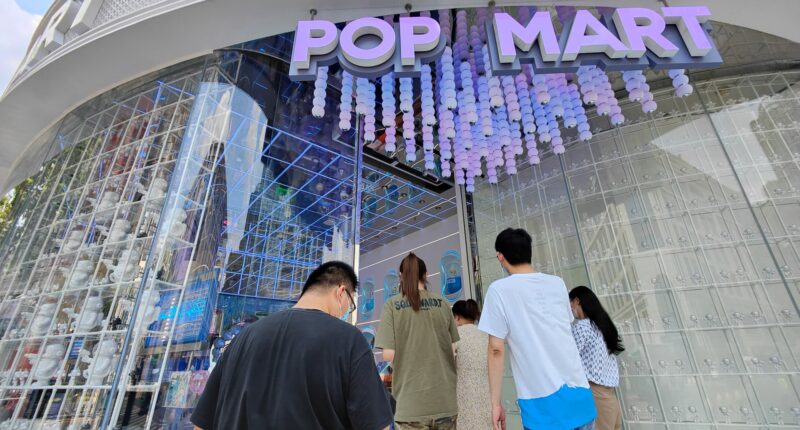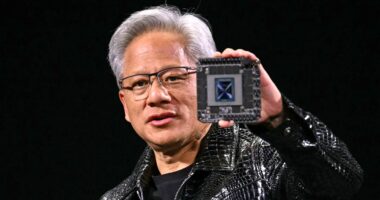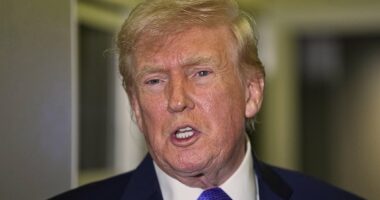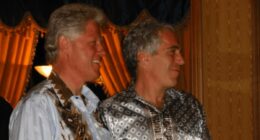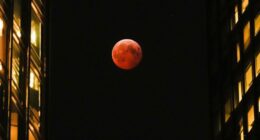Share this @internewscast.com
The global flagship store of Pop Mart, a Chinese toymaker and seller, at Nanjing Road Pedestrian Street on Aug. 16, 2022, in Shanghai, China.
Vcg | Visual China Group | Getty Images
Shares in Pop Mart International tumbled over 6% on Wednesday, a day after the toymaker issued a bullish first-half earnings forecast.
The Beijing-headquartered company is behind the global craze around Labubu, a toothy, pointy-eared monster-like character. The toymaker sells its dolls in a blind box to buyers who don’t know what character is inside until they open it, with prices ranging from about 59 yuan to 5,999 yuan.
In a filing to the Hong Kong stock exchange on Tuesday, Pop Mart said it expects at least a 350% increase in profit and at least a 200% increase in revenue for the first six months of 2025 from the same period last year. In the first half of 2024, Pop Mart recorded 93.3% growth in profit to 921.3 million yuan ($128.4 million), while its revenue grew 62% to 4.6 billion yuan.
The negative stock reaction may be a reflection of investors’ conservative outlook on Pop Mart’s sales growth, Jeff Zhang, an equity analyst at Morningstar, told CNBC on Wednesday.
“Despite stellar earnings growth in H1, it may have peaked and will likely see slowdown starting in H2,” he added, saying it may have prompted many investors to take profits.
Zhang maintained his view that Pop Mart’s shares have been “overvalued,” as the high level of uncertainty over the popularity of its major intellectual properties was not fully priced in.
In the filing Tuesday, the company attributed its robust profit forecast to the greater global recognition of its brand and intellectual properties — referring to signature toy characters such as Labubu, Molly and Crybaby — and diversified product portfolios, as well as a growing portion of overseas sales.
It also benefited from a substantial increase in profits driven by the economies of scale, cost optimization and tighter expense controls, the company said.
A human-sized Labubu figurine is displayed before an auction in Beijing, China June 6, 2025. The figurine was later sold for 1.08 million yuan at an auction by Yongle International Auction on Tuesday.
Tingshu Wang | Reuters
Buoyed by the runaway success of Labubu figurines, Pop Mart’s Hong Kong-listed shares have been on tear this year. Despite the latest tumble Wednesday, its share prices have nearly tripled year to date, trading at 247 Hong Kong dollars at 11:43 p.m. ET.
The stock suffered a brief setback last month after an editorial from Chinese state media took aim at businesses enticing young children to spend excessively on “blind cards” and “mystery boxes,” a model central to Pop Mart’s appeal.
Investors have largely shrugged off fears of a regulatory crackdown on Pop Mart, which counts Gen Zers and millennials, rather than young children, as main consumer demographic.
Long-term growth
But despite the latest pullback in share prices, many investment banks held on to their bullish calls for Pop Mart to remain one of the hottest consumer brands in China this year.
In the first quarter of this year, the toymaker’s revenue rose 170% from a year earlier, buoyed by a nearly 480% surge in overseas markets and about 100% revenue growth at home.
The latest profit forecast was “slightly above the capital market’s already-high expectation,” analysts at Nomura Bank said in a note Tuesday, underscoring the “continued acceleration of sales growth.”
The investment bank lifted its target price for Pop Mart to 330 Hong Kong dollars from 291 Hong Kong dollars, keeping the stock as its “preferred pick in the China consumer space.”

Pop Mart International
Pop Mart’s soaring popularity has been a stark contrast to the broader economic downturn in China which has led consumers to become more frugal and scale back on spending. A human-sized Labubu was sold for $150,000 at an auction in Beijing last month.
“When optimism about long-term financial prospects fades, people shift from investing in the future, [buying] homes, cars, to seeking momentary emotional rewards,” said Ivy Yang, founder of Wavelet Strategy, New York-based consultancy.
“Each collector [is] projecting their own mood or story onto the toy. This is why Pop Mart differs from Sanrio or Miniso,” Yang added, referring to the Japanese toymaker behind Hello Kitty and a Chinese retailer for consumer goods such as cosmetics, stationery and toys featuring IP design.
